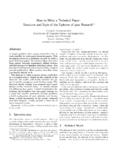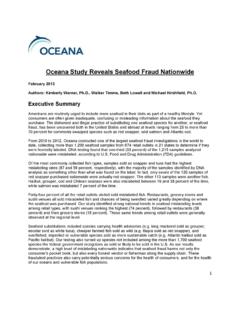Transcription of An interview with Don Hedeker - healthstats.org
1 An interview with Don HedekerJuned Siddique1 Received: 2 March 2016 / Accepted: 14 July 2016 / Published online: 23 July 2016 Springer Science+Business Media New York 2016 AbstractDon Hedeker was born in the late 1950s in Chicago, Illinois. He attended publicschools in Chicago and did his undergraduate work at the University of Chicago, earning adegree in Economics in 1980. In 1981, he began graduate work in the Department ofBehavioral Sciences, Committee on Research Methodology and Quantitative Psychologyat the University of Chicago. He completed his dissertation in 1989 under the direction ofDarrell Bock.
2 In 1993, Don accepted a faculty position at the University of Illinois atChicago (UIC) where he was promoted to tenured Associate Professor in 1996 and to FullProfessor in 2001. He spent 20 years on the faculty at UIC, leaving in 2014 in order toreturn to the University of Chicago as a Professor of Biostatistics in the Department ofPublic Health Sciences. Don s main expertise is in the development and dissemination ofadvanced statistical methods for clustered and longitudinal data. In addition to manymethodological papers in these areas, Don has developed several freeware computerprograms for statistical analysis of such data.
3 To date, he has published over 180 papersand 1 book. Don is also an accomplished musician, and has played in bands since highschool. This interview was conducted in honor of Don being awarded the 2015 Long-termExcellence Award from the Health Policy Statistics Section of the American StatisticalAssociation. The interview took place in Don s office at the University of Chicago onDecember 23, of Chicago Mixed-effects models Darrell Bock RobertGibbons The Polkaholics&Juned of Preventive Medicine, Northwestern University, Chicago, IL, USA123 Health Serv Outcomes Res Method (2016) 16:75 91 DOI Early years and graduate schoolJuned:I was going to send you the questions ahead of time, but you once told me thatsometimes when you go into the studio, the first cut is the :That s right.
4 Sometimes the spontaneity, you can t recreate it. [Laughs.]Juned:Don, tell me about your parents and your childhood. You were born and raised :Right. I grew up in Logan Square and then we moved to around Jefferson Park. Myparents were World War II war refugees. They were German. My mom was born in theCrimea, my dad in Czechoslovakia. They got forced out of those areas as the war pro-gressed, made it to Germany, stayed there for a few years, then came to the And thenthey met :Those are neighborhoods on the Far Northwest Side of Chicago?Don:Yes, on the Northwest Side of Chicago. Especially Jefferson Park.
5 I went to grammarschool there, went to Lane Tech High School ( ), and then for college, I came here tothe University of :You studied economics at the University of Chicago. How did you settle oneconomics to begin with ?Don:I had no idea. I knew that I wanted to do something with math, but applied math, andso it seemed like econ was like that. And then I took two micro econ courses and twomacro econ courses, and came to , that s really not what I like. But luckily theecon degree allowed you take math classes as electives, so I only actually took five econcourses and then supplemented that with a lot of math and then statistics courses, and Ifound that that s really what I :And then did you go straight to graduate school at the University of Chicago?
6 Don:No, I graduated in 1980 and then spent a year working at Rush St. Luke s MedicalCenter in the Department of Psychiatry as a data analyst. I had taken as an undergraduateabout four or five stat classes, so I knew enough to do some basic statistics. So got a jobthere and worked there for a year. During that year they brought Robert Gibbons on to beFig. 1 Don s high school identification card from Lane Technical High School in Chicago76 Health Serv Outcomes Res Method (2016) 16:75 91123the statistician on a multi-site study on depression called the CollaborativeDepression met Robert, and he told me about this program in quantitative psychology method-ology at the University of Chicago and that they had the Thurstone Fellowship.
7 He said Ishould apply for that. At that time I was still thinking of maybe going into music as acareer, so I was playing in bands. But then I thought, So I did apply, and I wasalways thinking of going back to graduate school, but not maybe so soon. I was thinking oftaking a few years off. But I got this fellowship and I thought gosh, if I can go to theUniversity of Chicago for graduate school for free, I can t pass that remember the first time I met Darrell Bock, and he said you ve just got to getimmersed in this, and I was like, ooh, I m not so sure if I want to do :I m in a :Yeah, right, :Could you tell us a little bit about the Department of Behavioral Sciences,Committee on Research Methodology and Quantitative Psychology?
8 Don:It was a small committee within Psychology. Bock, Don Fiske, those were the twobig names. Steve Shevell was there. I guess about four or five faculty altogether. So it wasa small group, which meant that we took courses in methodology. Bock taught courses onmultivariate statistics, on log-linear modeling, on item response theory. And Fiske taughtcourses on research methodology designing studies, evaluation research so I tookcourses like that. Shevell taught a class on mathematical psychology, and also one onexperimental design. That was another one within our committee. But there weren t thatmany, because it was a small group, so we were encouraged to take classes in statistics, ineconometrics, in other areas.
9 And so I took a lot of courses, actually, in statistics at :And how much of your coursework was traditional psychology?Don:Very little. In fact I never took a course like Intro to Psychology. We had to have asubstantive area, and I chose pharmacology because I was working in the Department ofPsychiatry as a data analyst, and I thought that it would make sense to learn their I took two, three, four classes in pharmacology, something like that. And learned a littlebit of pharmacology. So I ve kind of learned psychology on the fly. It sort of mimics myundergraduate career, in a sense, where I was an econ major, but I really didn t take thatmuch :Do you feel like it was a good choice to study quantitative psychology versussomething more traditional like statistics or biostatistics or even economics?
10 Don:You know, I ve often thought about that. What was really good about quantitativepsychology was that because it was a small committee, we took classes in other areas,whereas if I were strictly in a biostat program, I might not have done that. So the benefitwas I learned how sociologists applied statistics, how econometricians applied statistics,how statisticians thought about statistics, how psychologists did, and I got exposed to, inparticular, latent variable models in that time this was in the 1980s there wasn t that much exposure to latent variablemodels of any type in statistics, per se. But in psychology, you can t measure IQ orpersonality with a blood test, right, so it s all latent variables, really.




